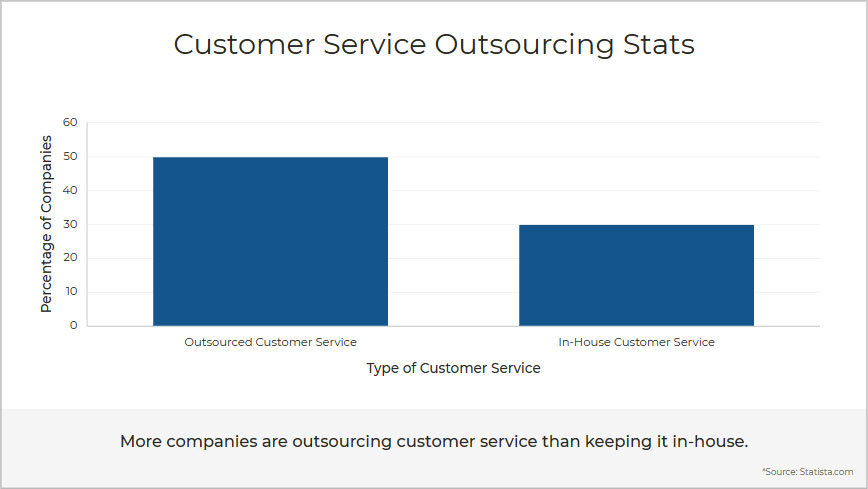Are you considering outsourcing your ecommerce customer support? You’re not alone. Many leading companies, including Amazon, Alibaba, eBay, Zappos, Best Buy, and Apple, have leveraged outsourcing to enhance their customer service operations.
This strategic move enables them to handle vast volumes of customer interactions efficiently while upholding high quality standards. A recent study revealed that 54% of companies use third-party support teams to engage with customers, underscoring the prevalence of outsourcing in today’s digital marketplace.
OUTSOURCE WITH 1840: Our customer support outsourcing services offer scalable, expertly managed solutions tailored to enhance your global customer experience.
What is Ecommerce Outsourcing?
Ecommerce outsourcing is the practice of hiring external service providers to manage specific functions of an online business that are typically handled internally. These functions can include customer support, order processing, logistics, content creation, and digital marketing, among others.
The service providers are often specialists in their respective fields, equipped with the necessary technology and processes to perform these tasks efficiently.
Outsourcing allows ecommerce businesses to leverage external expertise without the overhead associated with expanding their in-house teams. This arrangement is particularly beneficial for businesses looking to expand their operations or enhance their service offerings without committing extensive resources to infrastructure or new hires.
Did you know? According to a survey by Microsoft, 96% of consumers worldwide say customer service is an important factor in their choice of loyalty to a brand.
10 Reasons Why Outsource Ecommerce Customer Service?
Outsourcing ecommerce customer service has become a strategic approach for many businesses looking to enhance their operational capabilities and customer satisfaction. Here are ten reasons why this model might be right for your company:
1. Cost Efficiency
One of the most compelling reasons to outsource ecommerce customer service is the significant cost savings it offers. Managing customer service internally can be expensive, requiring investments in training, salaries, benefits, and infrastructure. Outsourcing shifts these fixed costs to variable costs, turning regular expenses into flexible ones that can scale with your business’s needs. Additionally, outsourcing firms often operate in regions with lower labor costs but maintain a pool of highly skilled agents, further reducing the cost of service without compromising quality. This setup allows businesses to enjoy reduced overhead while reallocating saved resources to other critical areas such as product development and market expansion.
2. Scalability
Outsourcing customer service provides ecommerce businesses with the flexibility to scale operations up or down based on current business demands. During peak seasons or unexpected surges in customer inquiries, outsourced partners can quickly add more agents to handle the increased volume. Conversely, during slower periods, you can scale back resources without the hassle and financial burden of laying off staff. This scalability is crucial for maintaining high service levels without committing to the fixed costs of a large in-house team, ensuring that customer service quality remains high regardless of the fluctuating needs of the business.
3. Access to Specialized Expertise
Outsourcing allows ecommerce businesses to tap into a pool of specialized expertise that may be too costly or impractical to develop in-house. Customer service outsourcing firms often employ staff who are trained extensively in specific areas such as technical support, live chat management, multilingual communication, and high-touch customer care. These specialists are equipped to handle complex queries and provide high-quality service that enhances customer satisfaction. By leveraging this expertise, companies can offer a level of service that differentiates them from competitors and aligns with global best practices, all without the significant investment in training and development that such expertise would require internally.
4. Enhanced Customer Experience
Outsourcing your ecommerce customer service can lead to a significantly enhanced customer experience. Specialized outsourcing firms are proficient in the latest customer service techniques and technologies, ensuring that each customer interaction is handled with care and professionalism. This includes providing 24/7 support, something that can be prohibitively expensive for many companies to manage internally. With expert agents trained in effective communication and problem-solving, customers receive fast, courteous, and effective responses that promote satisfaction and loyalty. Moreover, these outsourcing partners often have sophisticated tools for monitoring customer feedback and performance metrics, enabling continuous improvement in service quality that directly benefits your brand reputation and customer retention.
5. Focus on Core Business Functions
Outsourcing ecommerce customer service enables companies to concentrate on their core business functions—those activities that are central to their competitive advantage and revenue generation. By delegating customer service tasks to external experts, businesses can allocate more time and resources to areas such as product development, marketing strategies, and business expansion. This focus on core competencies can lead to enhanced innovation, faster market adaptation, and improved overall business performance. It allows the leadership and skilled employees to dedicate their expertise to driving the business forward rather than dividing their attention among non-core, albeit important, operational tasks.
6. Risk Mitigation
Outsourcing customer service can significantly mitigate various operational and compliance-related risks. External service providers specialize in managing customer interactions according to the latest industry standards and regulations. This is particularly beneficial for ecommerce businesses that operate in multiple regions, where different laws concerning consumer protection, data privacy, and labor might apply. By entrusting these aspects to experienced outsourcing partners, companies ensure compliance with all relevant legal requirements without having to invest heavily in legal and compliance infrastructure. Additionally, outsourcing firms have robust disaster recovery and business continuity plans that help protect against potential service disruptions, ensuring that customer service operations can continue smoothly under various circumstances.
7. Technology and Infrastructure
Outsourcing companies invest heavily in the latest technology and infrastructure to provide top-notch customer service. This includes advanced Customer Relationship Management (CRM) systems, omnichannel communication platforms, and cutting-edge data analytics tools. These technologies enable outsourced customer service teams to deliver a seamless, integrated customer experience across multiple touchpoints, from live chat and email to social media interactions. For ecommerce businesses, accessing these technologies through outsourcing means they can benefit from high-tech solutions without the capital expenditure and ongoing maintenance costs associated with owning and updating such systems themselves.
8. Management of Seasonal Volume
Ecommerce businesses often experience significant fluctuations in customer service demand, particularly during holiday seasons, sales events, or product launches. Outsourcing customer service provides the ability to scale response efforts up or down as needed, without the logistical and financial strain of hiring temporary staff or overburdening existing employees. This flexibility helps maintain high levels of customer service during peak times, ensuring that each customer receives timely and effective support, which can enhance customer satisfaction and boost loyalty during critical selling periods.
9. Continuous Improvement and Innovation
Outsourcing firms are driven by the need to stay competitive in their market, leading them to continuously innovate and improve their service offerings. This drive for improvement means they are constantly updating their processes, training their staff on the latest customer service strategies, and implementing the newest technologies. For an ecommerce business, partnering with such firms means benefiting from these innovations without the direct cost and effort of implementing them. This relationship not only keeps customer service practices fresh and effective but also ensures that the business can adapt to new customer expectations and evolving market conditions swiftly.
10. Global Talent Accessibility
Outsourcing customer service allows ecommerce businesses to tap into a global talent pool, providing access to skilled professionals from around the world. This international reach is especially beneficial for companies looking to offer support in various languages and across different time zones. By partnering with outsourcing firms that employ a diverse workforce, businesses can ensure that their customer service is culturally relevant and linguistically accurate, enhancing the customer experience for a global audience. Additionally, this access to a broader talent base can lead to more innovative problem-solving and diverse perspectives within customer interactions, further improving service quality and customer satisfaction.
Potential Downsides of Outsourcing Ecommerce Support
While outsourcing ecommerce customer service offers numerous benefits, there are potential downsides that businesses should consider to make informed decisions.
- Loss of Control: When outsourcing, companies hand over part of their operations to a third party, which can lead to concerns about loss of control over the quality and consistency of customer interactions. Ensuring that the outsourcing partner aligns with the company’s standards and values is crucial but can be challenging.
- Cultural Misalignment: Differences in cultural norms and communication styles between outsourced service agents and customers can sometimes lead to misunderstandings or dissatisfaction. Selecting an outsourcing partner with experience in serving a similar demographic can help mitigate these risks.
- Quality Issues: There’s a risk that the outsourced service might not meet the expected quality standards, especially if the outsourcing provider does not have stringent training and quality assurance processes. Continuous monitoring and feedback mechanisms are essential to maintain service quality.
- Security Risks: Sharing sensitive customer data with an outsourcing provider can increase the risk of data breaches or non-compliance with privacy laws. It is imperative to choose partners who adhere strictly to international data security standards and privacy regulations.
- Dependency: Over-reliance on an outsourcing partner can become a strategic vulnerability, especially if the partnership is terminated unexpectedly or if the outsourcing company faces operational challenges. Diversifying service providers and developing contingency plans are strategies to reduce this dependency.
Commonly Outsourced Ecommerce Customer Service Channels
Outsourcing ecommerce customer service encompasses a variety of channels, each playing a crucial role in maintaining effective customer relations. Here are the most commonly outsourced channels:
- Live Chat Support: Live chat has become an essential customer service channel due to its immediacy and efficiency. Outsourcing this service allows businesses to provide real-time assistance, helping customers with inquiries, order issues, or even upselling products during their browsing experience.
- Email Support: Despite the rise of instant messaging, email remains a preferred communication channel for many customers, especially for more detailed inquiries or when documentation is necessary. Outsourcing email support ensures that customer emails are handled professionally and are responded to in a timely manner, maintaining thorough records of interactions.
- Social Media Management: As customers increasingly turn to social media platforms to express concerns and seek assistance, managing these platforms efficiently becomes crucial. Outsourcing social media management not only helps in timely and effective customer communication but also in monitoring and maintaining the company’s brand presence online.
- Telephone Support: Voice support is critical for dealing with complex issues or for customers preferring personal interaction. Outsourcing telephone support can greatly enhance the customer experience by reducing wait times and providing access to skilled representatives trained to resolve issues promptly and courteously.
- Technical Support: For ecommerce businesses that sell tech-based products or require specific expertise, technical support is vital. Outsourcing this service to specialists ensures that customers receive accurate, knowledgeable help which improves resolution rates and customer satisfaction.
Best Countries for Outsourcing Ecommerce Customer Support
When selecting a location for outsourcing ecommerce customer support, businesses often consider factors like language proficiency, cultural compatibility, economic stability, and the local talent pool. India and the Philippines are top choices due to their large, English-speaking populations and expertise in customer service.
Eastern European countries, including Poland and Ukraine, are also favorable for their multilingual capabilities and cultural proximity to Western European markets.
Latin America, particularly Mexico, is gaining popularity for nearshoring because of similar time zones and growing English proficiency.
Each of these regions offers distinct advantages, such as cost efficiency and skilled labor, making them strategic choices depending on a company’s specific needs and customer base.
Conclusion
In an increasingly competitive e-commerce landscape, delivering outstanding customer service can be a game-changer. Outsourcing customer support presents a strategic solution, offering all the benefits we discussed above. By understanding these advantages and addressing the potential downsides through diligent provider selection, businesses can effectively extend their operational capabilities and focus on core competencies.
If you are interested in outsourcing your ecommerce customer support, schedule a call with our growth experts to discuss a custom solution for your needs.





